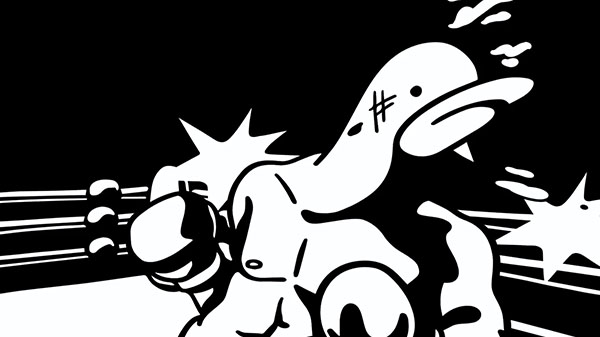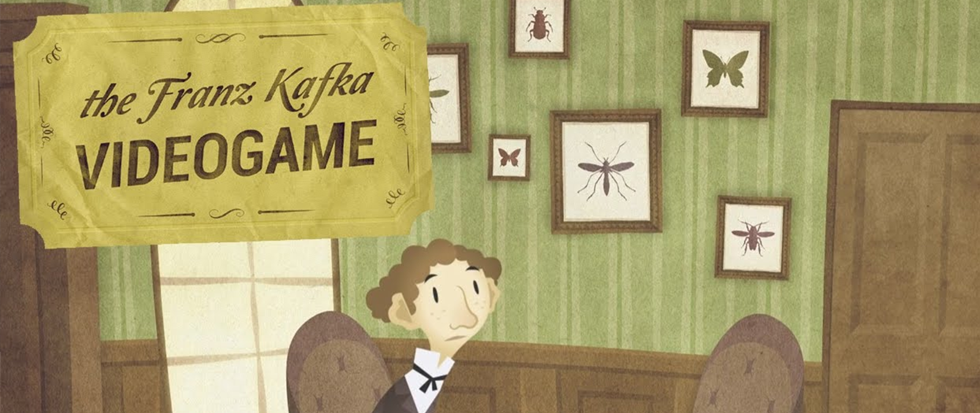
Pato Box’s Fisticuffs Lack Punch
Narrative ambiguity can be a compelling literary device; when used incisively, it can keep audiences deeply engaged with its works, while allowing them to interpret these stories in their own way. Blade Runner, for instance, purposely kept facets of its film, characters and settings cryptic, while the true nature of replicant hunter Rick Deckard was shrouded in mystery. The recurring dreams about unicorns that Deckard has, coupled with his fellow replicant hunter Gaff’s penchant for taunting him (and us) about Deckard’s humanity, has caused fans to feverishly debate this conundrum for decades.
I’m rattling on about this, because narrative ambiguity can be such a beautiful thing. When stories present us with tangible gaps, we would attempt to fill in the missing details with chimerical fervor, our instinctive need for resolutions drawing us even closer to the story. Unfortunately, the fighting game Pato Box has zilch of such subtleties in its monochromatic universe, its morality and narrative a facsimile of its black and white hues. Even its duck-faced hero’s repugnance for shirts is an overt metaphor for his unconcealed manner of confronting his issues; he simply trudges ahead wordlessly, walloping through waves of objects and opponents with nary a word.
In one of the most blatant examples of corporate greed running amok, the headquarters of mega-corporation Deathflock is adorned with posters emblazoned with words like, “Give us your money”, “Join us: Be part of the system”, and “Work until you’re dead”. Deathflock is Evil personified, and perhaps this says more about the state of its world when businesses can get away with such proclamations like a moustache-twirling villain who slaughters puppies for sport. Moreover, you can even read the private thoughts of bystanders and villains, which becomes downright peculiar especially before cinematic fights. It’s a little like watching an ostentatious wrestler trash-talking before a major tournament, while interjecting his own displays of bravado with meek whispers about his insecurities.

Perhaps the point of Pato Box is less about its story and setting. Perhaps it’s more about its exploration of the Punch-Out!! mechanics, and how that can be reimagined as a means of experiencing a stylish crime drama about double-crosses and revenge. But when much of Pato Box’s excessive visual stylings is reminiscent of film noir—a point I noted when writing about its demo in a previous article—it’s just as much a disappointment when the game is sadly devoid of the genre’s trademark intriguing storytelling and gritty characterization. I yearn to learn more about its oppressive city, wander about its dimly-lit streets and watch Duck-Man take in a huge gulp of stale air while prowling the rain-soaked boardwalks. And I’m saying this because I am truly enarmored of Patobox the pugilist. For he would have been such a phenomenal noir protagonist, especially with his lovely, vacant eyes; the fact that he’s probably the only duck-human hybrid in this world speaks volumes of his social estrangement, his fractured existence mired in endless drudgery and loneliness. Imagine the radical premise of a broken man who can never vocalize his emotions, whose impassive and even comedic facade masks a mournfulness the rest of society could never pick up on.
The original conceit of Pato Box was still a riveting and refreshing one—and I mean the bit about punching the bejeezus out of people, robots and everything else. Beneath this Sin City facade lies a rhythm game, and you’ll need to memorize and anticipate every attack your opponent flings at you, which are varied and often imaginative. This makes its one-on-one Punch-Out!!-esque matches an hugely satisfying jaunt, but even the route to these matches are so mercilessly punishing that it’s already exhausting to get to that stage. If you’re solely in it for the fights, you’re probably one of those gaming masochists who enjoy spending hours getting pummeled to a pulp till you execute a perfectly timed series of punches and dodges—in which case, this title may be just for you! But for me, it’s hard to muster any motivation to go on outside of managing these carefully choreographed fights, and I’ve largely given up these battles after failing to make any meaningful progression a few hours later.
Pato Box felt like the synthesizing of some of the more exciting ideas for a game I’ve heard in a while, tapping on the ferocity of Punch-Out!! combat mechanics to navigate the bleak and tyrannical cities of noir. There lies a potentially powerful correlation between the bold act of punching and cynicism of noir in this concept; words are often deceptive in film noir, lending to a taut air of pessimism and defeatism where guns and fists are more valued over cheap, ambiguous promises. However, Pato Box’s punches feel a tad dulled by its omission to focus on its noir roots and include meaningful ambiguity, robbing the title of the opportunity to become a truly exceptional fighting game.





